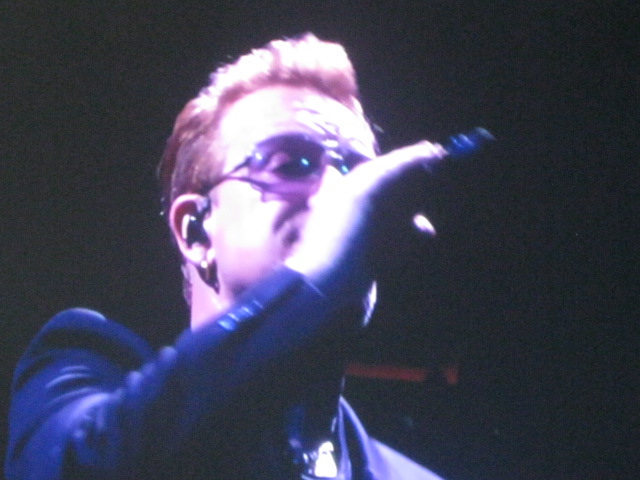
I finally did it: I saw U2 in concert at Madison Square Garden, 30 July 2015.
I may have waited too long to catch the band in its prime, but its 37 years of experience -- without a personnel change -- and undiluted passion have made it one of the biggest concert draws for decades now, even if recent albums have been uneven in inspiration.
The current tour, with Thursday night being the next-to-last of eight shows at Madison Square Garden, is promoting last year's Songs of Innocence, which I mostly like. It figured that the annoying album opener, "The Miracle of Joey Ramone" (I wrote that it "panders like a commercial") would also be the concert opener (unless you want to give that honor to Patti Smith's recording "People Have the Power," which at all those shows is the song the quartet has walked on to, coming through the audience and climbing onstage). But then, pandering is an important element of arena rock, and works better in person than on record -- and credit to Bono, who had the balls to get the audience to make a call-and-response ritual of its wordless vocal riff before any instruments were played.
Then we were treated to a blast from the past, "The Electric Co." from U2's debut album -- hardly an obvious choice, unlike that album's opener, "I Will Follow," which with its instantly recognizable guitar hook followed in short order, unfortunately with the execrable "Vertigo" in between. ("The Electric Co." included a brief paraphrase of Stephen Sondheim's "Send in the Clowns," with Bono changing it to "bring on the clowns.") "I Will Follow" showed, hardly for the last time this evening, the undeniable power of thousands of people singing a chorus with no prompting, just out of sheer love.
Bono talked a lot. We got five minutes of chatter that besides the usual "New York, you're great" content included him reminiscing about participating the previous day in the city's first John Lennon Day at a ceremony on Ellis Island that included Yoko Ono; Bono said he'd declared that all the Beatles were Irish, not just Lennon, and that a day later he was sticking with that story. He then set the stage for a string of three more from Songs of Innocence: "Iris (Hold Me Close)," dedicated to his mother, with its last lines delivered a cappella in a touching move; the more boisterous "Cedarwood Road," which was accompanied by animation on a gigantic screen; and "Song for Someone," during which the animation was more prominent.
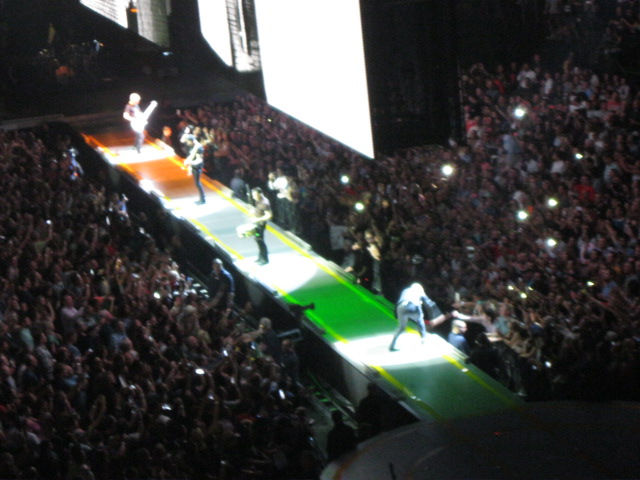
This seems like a good point at which to describe the staging. There was the usual large, rectangular stage in the usual spot; there was a smaller, round stage in the middle of the arena; and there was a broad walkway between them. The aforementioned screen was actually two-sided, hanging parallel over the walkway. This setup came into play on the next number, with drummer Larry Mullen, Jr. coming to the front of the stage with just a snare drum he whacked periodically. He continued onto the walkway, and gradually the others followed as they went into a visually and musically stark rendition of "Sunday Bloody Sunday" that included the interjection of a sound collage heavy on Dublin newscasts climaxing with a bombing, immediately followed by Bono's most recent musical response to that sort of thing, "Raised by Wolves." The latter closed with reference visually and from Bono to the horrific May 17, 1974 bombings that killed over thirty people, topped by Bono singing "comfort me" over and over.
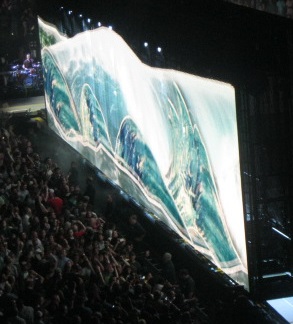
The screens came all the way down, covering the walkway, to show animation of ocean waves for "Until the End of the World" (a climate change reference, perhaps?), the first song to that point from Achtung, Baby. Then the band disappeared into the screened-off walkway and a remix of that album's "The Fly," even more electro'd up, played (not played by the band) as texts with socio-political import were displayed on the screens. This was followed by a distorted version of "Invisible," and it was unclear whether it was also canned, or played by the band, until gradually the quartet was revealed to be playing between the screens -- it was a brilliant blurring of perceptions. (By the way, "Invisible," with its ending slogan of "there is no them," so far has been released only as a single, yet is better than anything on Innocence.)
There was more from Achtung, surprisingly the album most drawn from besides Innocence. "Even Better Than the Real Thing" found the band moving onto the circular stage for awhile, and "Mysterious Ways" found them being joined by a guy in a mirrorball construction helmet and silver lamé. At first he danced; then he circled the band for some "mobbing" using the Meerkat app (this was projected on the TV screens spread around the arena). This was also when Bono introduced a tourist from Virginia and some firemen from NY Engine Co. 44 who had rescued her in Central Park after an accident; the highlight of this was one of the firemen handing Bono a glass of Jameson's Irish whiskey that he gratefully partook of.
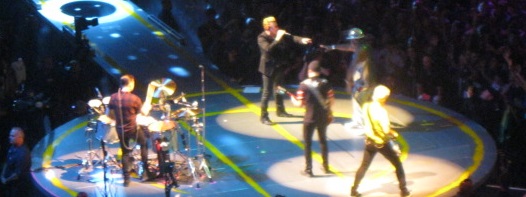
"Elevation" moved back to more standard U2 territory; for the Mandela soundtrack contribution "Ordinary Love," The Edge switched to acoustic guitar, which he stayed on for a duo cover (just like at Live Aid thirty years ago) of "Satellite of Love" by Lou Reed, who Bono called "the poet laureate of New York City." Reed's voice was sampled for one section of this tribute. Then it was back to Innocence for "Every Breaking Wave," another duo but with The Edge switching to a piano that flipped up from under the circular stage.
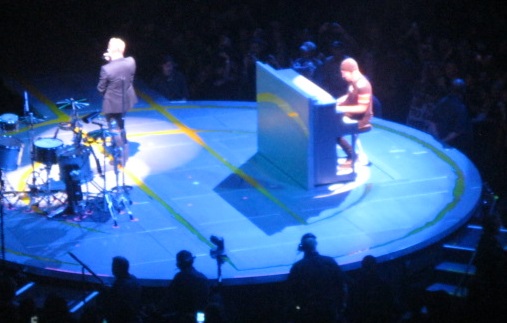
The full band returned as the show headed into the homestretch with highly familiar material. "Bullet the Blue Sky" updated the monolog in the middle with such observations as "the whole world has turned into America" and Bono taking a mock self-critical view of his fame and fortune. I do believe that for some of that, he was rapping. The Edge's electric guitar tone on this famous tune tonight suggested a David Gilmour (Pink Floyd) influence. The Martin Luther King tribute "Pride (In the Name of Love)" was prefaced by Bono spouting "don't shoot," "I can't breathe," and other topical phrases. During the "oo-oo-oo-oo" sing-along, he exhorted us to "sing for the peacemakers," and soon thereafter he astutely observed, "Nobody won in Ireland. That's why everybody won in Ireland."
"Beautiful Day" provided further evidence that Bono is the master of the grandiloquent melodic gesture, which would have been proven anyway by the following "With or Without You," complete with a little reprise of "bom bom bom satellite of love." Thus ended the official set.
Needless to say, there was sufficient applause to call the band back for encores. First, though, we heard a recording of Stephen Hawking waxing political. "City of Blinding Lights," one of the most beautiful of recent U2 songs, included some guy pulled up from the crowd singing to Bono and vice versa. The next guest was more famous: Paul Simon joined for a brief, ramshackle attempt at "Mother and Child Reunion," which Bono tied to the fight against AIDS/HIV. I swear, I think Simon sang not his song, but instead a bit of "Let It Be." Of course, "Where the Streets Have No Name" sounded entirely more secure and solid. On the closing "One," Bono let the audience sing with the band almost all the way through, and the crowd-sourced singing came off brilliantly on this call for unity.
I could complain about songs not performed, but after nearly two-and-a-half hours and twenty-six songs, that would be missing the point. There were plenty of good yet affordable seats, and at the aforementioned length, and with hardly any missteps along the way, this was better value than most arena shows I've been to.
